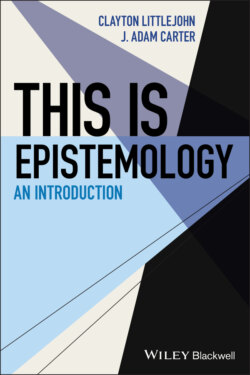Читать книгу This Is Epistemology - J. Adam Carter - Страница 34
2.9.1 On Cartesian Foundationalism
Оглавление2.71 The Cartesian foundationalist thinks that nothing can stop the regress of justification unless it provides certainty. It's important to distinguish between two kinds of certainty, psychological and evidential:
Psychological certainty: A proposition is psychologically certain for a thinker iff they cannot doubt to even the slightest degree whether it is so.
Evidential certainty: A proposition is evidentially certain for a thinker iff the thinker's belief in that proposition could not be mistaken given the thinker's evidence.
These kinds of certainty can come apart. If we have epistemic certainty without psychological certainty, we suffer from a kind of confidence deficit – we should have more of it. (Imagine that someone has just constructed a proof but lacks the confidence to believe that they've solved a tricky mathematical problem.) If we have psychological certainty without evidential certainty, we suffer from a kind of confidence surplus – we should have less of it. (Imagine that someone is a member of a cult. They believe outrageous things on the word of a charismatic liar and nothing can shake their conviction.) The Cartesian foundationalist thinks that we need evidential certainty to stop the epistemic regress. Can experience provide it?
2.72 Many philosophers have thought not. They might offer this argument in support of their position:
An Epistemological Argument from Error
P1. The evidence that experience gives us in a case of hallucination doesn't make it evidentially certain that our beliefs about the external world are true.
P2. The evidence that experience gives us in an indistinguishable case of perception is the same as the evidence that we get in a matching case of hallucination.20
C. So, experience doesn't give us evidential certainty in the case of hallucination or perception.
The argument's first premise seems right. If I'm hallucinating a candle, there needn't be any candle in the vicinity for my experience to have the conscious character that it does. A complete description of my experience wouldn't tell us whether there was a candle there or not, so a complete description of my evidence doesn't provide us with evidential certainty for believing that there's a candle there. If my evidence really is the same in both cases, experience alone doesn't provide evidential certainty.
2.73 Recall, however, that not everyone believes that the experiences we have when we see a candle are conscious occurrences that involving nothing outside the head. Recall that the disjunctivist about experience thinks that while hallucinations might involve nothing outside of the head, the experience you have when you see something consists of a relation of direct awareness that involves you and the candle. When you see that there is a lit candle on the table, you have excellent reason to believe that there is a candle nearby – you see that there is! When you suffer from some hallucination, it's false that you see that there is, so this couldn't be a good reason for you to believe that there is one nearby. Perhaps the disjunctivist gives the Cartesian foundationalist the tools they need to understand how it's possible to have non‐inferential justification for our beliefs about the external world.
